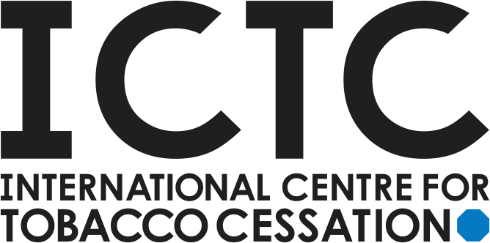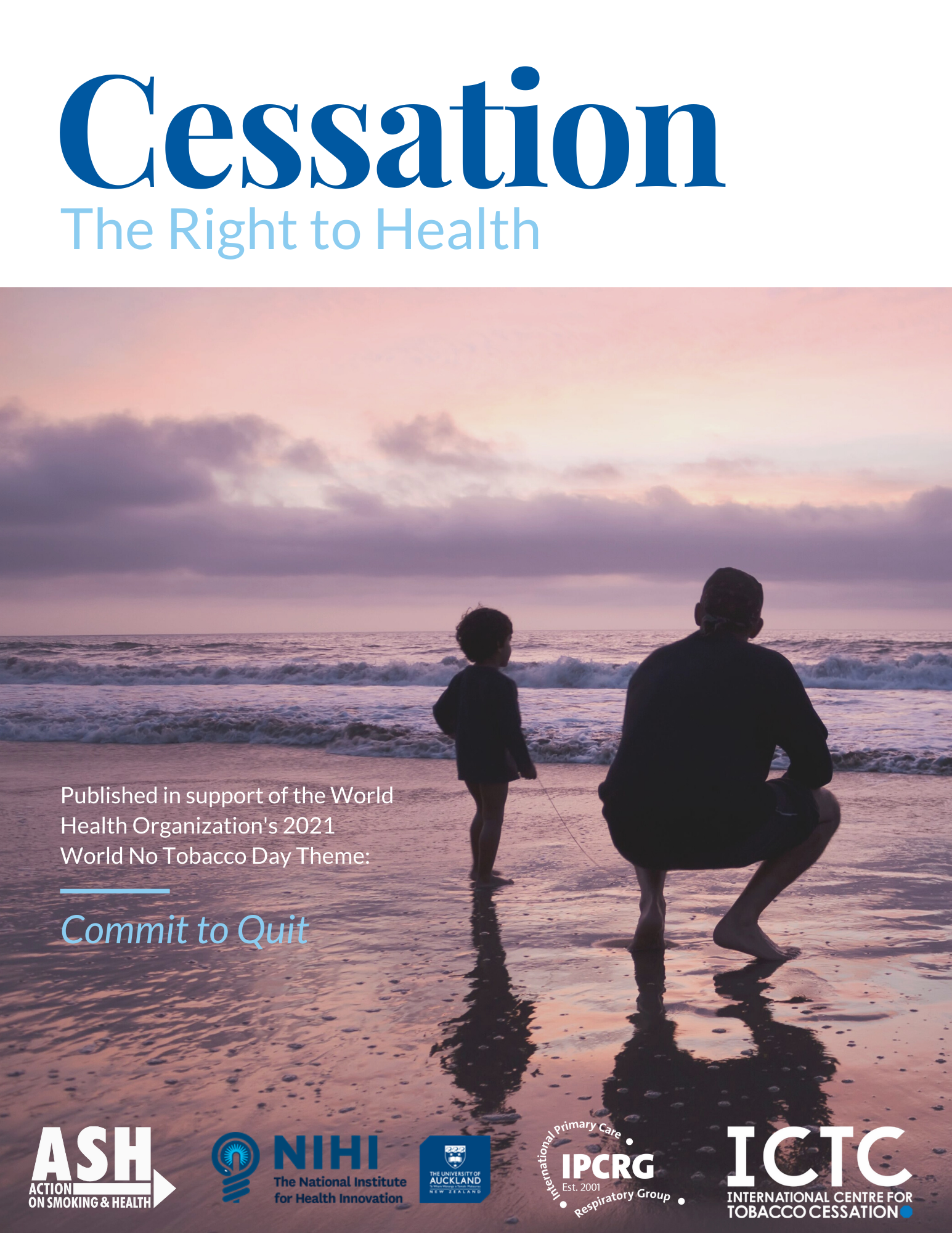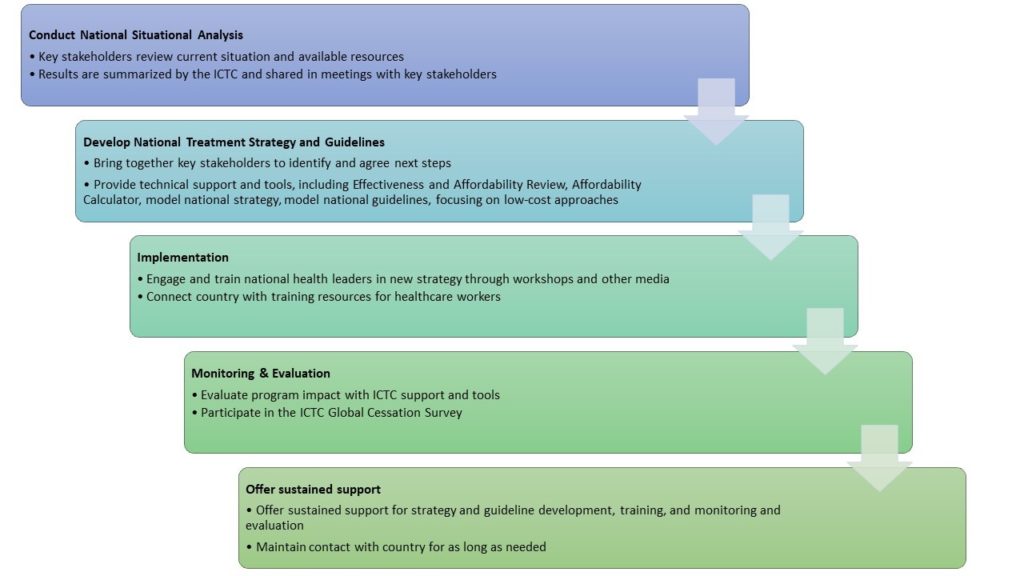 There are currently 1 billion smokers in the world, 80% of them in low and middle income countries. According to the World Health Organisation (WHO) tobacco causes over 7 million deaths every year, and on current trends deaths will increase dramatically. In the 20th century 100 million people died prematurely from smoking. It is estimated that this century 1 billion will die.
There are currently 1 billion smokers in the world, 80% of them in low and middle income countries. According to the World Health Organisation (WHO) tobacco causes over 7 million deaths every year, and on current trends deaths will increase dramatically. In the 20th century 100 million people died prematurely from smoking. It is estimated that this century 1 billion will die.

The ICTC is dedicated to reducing these deaths by helping people throughout the world stop smoking. Only smoking cessation will have a major impact on these numbers. The World Bank estimated that halving the number of young adults becoming smokers by 2020 would save 20 million lives by 2050. However if by 2020 we halved the number of adult smokers then by 2050 180 million lives could be saved.
Tobacco is also a human rights, environmental, and sustainable development issue. In 2017 the UN Human Rights Council affirmed “the right of everyone to the enjoyment of the highest attainable standard of physical and mental health” and urged states “to work towards the full implementation of all Sustainable Development Goals”, including strengthening implementation of the Framework Convention on Tobacco Control (FCTC), which sets out the measures countries should take to reduce tobacco use, including FCTC Article 14 – cessation support and treatment.
Tobacco cessation support is effective (including aids like nicotine gum, quitlines, text messaging and face-to-face behavioural support), yet according to WHO only one third of the world’s population have access to adequate help to stop smoking.
The ICTC mission is to fill this gap by increasing the availability of treatment throughout the world, helping countries to develop effective, affordable tobacco cessation programmes. The ICTC was created through the pioneering work of its founder and director, Professor Martin Raw, a pioneer and internationally respected tobacco cessation leader for more than 40 years.
Five key strategies through which the ICTC assists countries:
1.) Offer global leadership and advocacy to promote tobacco cessation support.
2.) Enable key national stakeholders (governments, health professional associations, civil society including NGOs) to analyse and improve their cessation provision.
3.) Train health leaders in the methodology developed by the ICTC, which includes tools and resources countries can use to improve their cessation support.
4.) Partner with key international and regional organisations to run capacity building workshops, working with national ministries of health and other key stakeholders.
5.) Monitor and evaluate progress at country level and globally, and share the results to support country implementation, regional leadership, and global advocacy.
The ICTC is leading global advocacy for cessation support
Professor Raw recently led the writing of a consensus of more than 70 international experts calling for countries to make a stronger commitment to tobacco cessation treatment, published in the top scientific journal Addiction. Through his conference presentations, workshops, writing, and advisory work he is a powerful advocate for effective help for addicted smokers. His work was supported by Bloomberg Philanthropies from 2009-2015 and by Pfizer from 2017-2018. To date Professor Raw and the ICTC have worked with Bolivia, Costa Rica, Georgia, Jordan, Lebanon, Mexico, New Zealand, Palau, South Africa, Tokelau, Tunisia, Turkey and Uruguay.
How the ICTC works

Technical assistance and tools the ICTC uses:
- National Situation Analysis (NSA). Key national stakeholders complete a questionnaire which helps assess the state of tobacco cessation in the country, and identify options for improvement. ICTC leadership analyses the information and drafts a report with suggestions for next steps. Then the ICTC facilitates meetings to review the analysis and agree how to proceed. There are usually two to three meetings over two or three years, but ongoing support should be offered for as long as the country needs it. The ICTC’s independent role has proved particularly useful in improving communication and bringing together diverse stakeholders within a country, as many countries have no tradition of collaborative working.
- Development of National Treatment Strategies and Guidelines. Most countries still don’t have official cessation strategies or guidelines. The ICTC offers a template for a national strategy, and model cessation guidelines (from New Zealand), to help countries develop their own strategies and guidelines. The New Zealand guidelines were updated using the Effectiveness and Affordability Review (see below), demonstrating the value of an authoritative, scientific review of the evidence.
- Affordability Calculator and Effectiveness and Affordability Review (EAR). The Calculator is based on a literature review (EAR) and uses data from WHO and the World Bank, into which country specific cost data can be inputted. It enables national leaders to compare and identify cessation treatments affordable for that country.
- Monitoring and Evaluation. The ICTC has developed tools to help monitor treatment provision, at country and global levels. This includes a global survey on cessation treatment, which provides essential information on country progress, invaluable for global advocacy on FCTC Article 14. With sufficient support the ICTC will also publish a regular Global Cessation Report, including a database of case studies, to help countries learn from successes.
- Guidelines for implementation of Article 14 of the WHO Framework Convention on Tobacco Control
- Affordability calculator for healthcare interventions to to promote and assist tobacco cessation
- Effectiveness and Affordability Review: Health-care interventions to promote and assist tobacco cessation: a review of efficacy, effectiveness and affordability for use in national guideline development
- Effectiveness and Affordability Review (EAR) Key Messages
- Guidance on developing national tobacco cessation guidelines
- Model National Cessation Strategy
- National Situation Analysis (NSA): Introduction
- National Situation Analysis (NSA): Instructions
- National Situation Analysis (NSA): A tool to analyse tobacco cessation support at country level
- New Zealand Guidelines for Helping People to Stop Smoking
In memoriam
Dr. Martin Raw, the founder of the International Center for Tobacco Cessation (ICTC), passed away on April 13, 2024. Martin was a treasured friend and colleague to us here at ASH and to the entire global public health community, and his loss is deeply felt. Martin dedicated his career to saving lives by helping people quit smoking. There are many people around the world who are living longer lives because of his work. We are grateful for his friendship and collaboration, and ASH will continue to strive for his vision of a smoke-free world.
Martin Raw: Short Biography
 Director, International Centre for Tobacco Cessation; Visiting Professor, New York University, School of Global Public Health
Director, International Centre for Tobacco Cessation; Visiting Professor, New York University, School of Global Public Health
Degrees
BA, Psychology and Physiology, Oxford University (1972); MPhil, Clinical Psychology, London University (1974); PhD, Helping People Stop Smoking, London University (1985).
Awards
2012 American Cancer Society Luther Terry Award for Outstanding Individual Leadership;
2017 SRNT John Slade Award for SRNT members who have made outstanding contributions to public health and tobacco control through science-based public policy and public advocacy.
Brief biography
In 1970s qualified as a clinical psychologist and ran Michael Russell’s Maudsley Smokers Clinic at the Maudsley Hospital in London, before focusing on applied research, and policy development and advocacy. My applied research has contributed to policy in several areas (see below). My current work focuses on helping countries implement FCTC Article 14, to develop better stop smoking treatment systems, on monitoring and evaluation, and on policy advocacy, arguing that countries should provide cessation support. From 2003-2016 I lived in Sao Paulo, Brazil and from 2017-2018 in New York, USA.
1982: NRT Co-author of first double blind controlled trial demonstrating that nicotine gum works.
1989–1995: Deputy Editor, scientific journal Addiction.
1991: Tobacco subsidies Luk Joossens and I published a paper on EU tobacco subsidies which revealed economic inefficiency and extensive fraud, and proposed their abolition. The European Court of Auditors used this paper in their report on EU tobacco subsisides, which were eventually abolished in 2005.
1995: Tobacco smuggling Luk Joossens and I published the first account of tobacco smuggling to receive international media coverage: Tobacco smuggling and cross border shopping in Europe. It was the first of several papers on smuggling. The illicit tobacco trade now has its own FCTC Protocol.
1998: Treatment guidelines I originated the project and was lead author of the English smoking cessation guidelines, which influenced the 1998 government White Paper on tobacco, and resulted in the creation of a tobacco dependence treatment service in the English National Health Service (NHS) in 1999.
2000: Cost of smoking in the workplace Published research showing the costs of smoking in the workplace and benefits of offering workplace cessation support.
2000–2020: Treatobacco.net Founder-member and Director of SRNT website www.treatobacco.net, manager from 2001 to 2010, Deputy Director 2011-2020. The site ran from 2000 to 2020 and presented independent, evidence based information on the treatment of tobacco dependence in 11 languages.
2007–present: Monitoring and evaluation A major research theme is monitoring of the provision of tobacco cessation support. Our group has published reports on the global status of tobacco dependence treatment in 2009, 2013 and 2017 (in 142 countries). I also collaborated with Luk Joossens on the Tobacco Control Scale, which measures tobacco control implementation in Europe.
2009–10: WHO FCTC Article 14 guidelines I led, on behalf of the UK government, the writing of guidelines on Article 14 (tobacco dependence and cessation) of the UN health treaty, the WHO Framework Convention on Tobacco Control (FCTC) by a working group of 36 countries. With Uruguay I presented them to the Fourth Conference of the Parties (COP4) to the FCTC in 2010, which adopted them. They represent official policy on tobacco dependence treatment for the 181 countries (to date) to the Convention.
2011–present: Implementing Article 14 I have developed tools to help countries implement Article 14. To date I have worked with New Zealand, Uruguay, Bolivia, Costa Rica, Mexico, Turkey, Jordan, Lebanon, Tunisia, South Africa, Tokelau, Georgia and Palau. This work was funded by Bloomberg Philanthropies from 2011–2016 and by Pfizer 2017–2018.
2015–present: International Centre for Tobacco Cessation Established the ICTC to develop the Article 14 implementation work globally. Currently seeking funding support.
2017–present: Visiting Professor, New York University, School of Global Public Health
Selected Publications
Jarvis MJ, Raw M, Russell MAH, Feyerabend C. A randomised controlled trial of nicotine chewing gum. British Medical Journal 1982;285:537-540.
Raw M, White P, McNeill A. Clearing the air. A guide for action on tobacco. London, BMA & WHO, 1990.
Joossens L, Raw M. Tobacco and the european common agricultural policy. British Journal of Addiction 1991;86:1191-1202.
Joossens L, Raw M. Tobacco smuggling and cross border shopping in Europe. BMJ 1995;310:1393-97.
Raw M, McNeill A, West R. Smoking cessation guidelines for health professionals. A guide to effective smoking cessation interventions for the health care system. Thorax 1998;53: Supplement 5 Part 1 pp 1-17.
Parrott S, Godfrey C, Raw M, West R, McNeill A. Guidance for commissioners on the cost-effectiveness of smoking cessation interventions. Thorax 1998;53: Supplement 5 Part 2 pp 1-35.
Parrott S, Godfrey C, Raw M. The costs of smoking in the workplace in Scotland. Tobacco Control 2000;9:187-192. https://tc.bmjjournals.com/cgi/content/abstract/9/2/187
Raw, Martin. Parar de fumar e possivel. Sao Paulo, Publifolha, 2004.
McNeill A, Raw M, Whybrow J, Bailey P. A national strategy for smoking cessation treatment in England. In Smoking treatment services in England: implementation and outcomes. Addiction 2005;100:Supplement 2: 1-11.
Raw M, McNeill A, Coleman T. Lessons from the English smoking treatment services. In Smoking treatment services in England: implementation and outcomes. Addiction 2005;100:Supplement 2: 84-91.
Raw M. Framework Convention on Tobacco Control (FCTC) Article 14 guidelines: a new era for tobacco dependence treatment. Addiction 2011,106,2055-2057.
West R, Raw M, McNeill A, Stead L, Aveyard P, Britton J, Stapleton J, McRobbie H, Pokhrel S, Lester-George A, Borland R. Healthcare interventions to promote and assist tobacco cessation: a review of efficacy, effectiveness and affordability for use in national guideline development. Addiction 2015;110:1388-1403. https://onlinelibrary.wiley.com/doi/10.1111/add.12998/pdf
Raw M, Mackay J, Reddy, S. Time to take tobacco dependence treatment seriously. Lancet 2016;387:412-413.
Nilan K, Raw M, McKeever T, Murray R, McNeill A. A survey of tobacco dependence treatment in 142 countries. Addiction 2017;112:2023-2031. https://onlinelibrary.wiley.com/doi/10.1111/add.13903/full
Raw M, Ayo-Yusuf O, Chaloupka F, Fiore M, Glynn T, Hawari F, Mackay J, McNeill A, Reddy S. Recommendations for the implementation of WHO FCTC Article 14 on tobacco cessation support. Addiction 2017;112:1703-1708. https://onlinelibrary.wiley.com/doi/10.1111/add.13893/full
Nilan K, Murray RL, McNeill A, McKeever TM, Raw M. Progress in implementation of WHO FCTC Article 14: A survey of tobacco dependence treatment guidelines in 61 countries. Addiction 2018;113:1499-1506. https://onlinelibrary.wiley.com/doi/epdf/10.1111/add.14204
Shelley DR, Kyriakos C, McNeill A, Murray R, Nilan K, Sherman SE, Raw M. Challenges to implementing the WHO Framework Convention on Tobacco Control guidelines on tobacco cessation treatment: A qualitative analysis. Addiction 2020;115:527-533.



